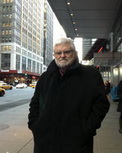 Chris
McDonnell, UK
Chris
McDonnell, UKchristymac733@gmail.com
 Chris
McDonnell, UK
Chris
McDonnell, UK
christymac733@gmail.com
Previous articles by Chris Comments welcome here
October
25, 2017
So
it is time to say our prayers

I wonder how many books have been written about prayer? Books telling us what words to use, where to be, sharing experiences, techniques, all sorts of ways of managing times of prayer.
In the end there is a danger that we try to learn complicated recipes for something that is essentially a simple act of being. The very phrase we often use with children follows us into adulthood-say your prayers! I would suggest that 'saying your prayers' is not the same as 'being at prayer'.
Above all, prayer is about openness, being present to the life and love of God throughout the day. Think for a moment of the monastic day, with its endless cycle of activity, of meals, of reading and times of community gathering for Liturgy. After the sleep and rest of night, it starts all over again, a cycle of life imbued with our prayerful presence in the love of God.
During the course of any day, there are occasions when prayer is heightened, when we meet someone who might benefit from our time, from our listening. At other times our experience slips and other demands take precedence. So in the flow of the day, hour by hour, there are threads we follow, highlights that mark one moment from another till the time comes for sleep when we join in the words of Night Prayer 'Save us Lord, while we are awake, protect us while we sleep; that we may keep watch with Christ and rest with him in peace'
Above all, prayer is about presence, an awareness of who we are and of the Lord who sustains our life.
The experience of the presence of God is often given the title 'Christian Meditation'. Meditation is not of course restricted to those of us who profess the Christian commitment to the Gospel of Jesus. Others seeking fulfilment adopt patterns of meditation that many Christian saints have recognised.
Such meditative practices have commonalities, one being stillness. It is hard to listen, to reflect on and absorb the gift of being if you are constantly distracted. Sitting still is not something we are very good at in this turbulent society. There is always something to do. So if we are to have time that is open to the shared gift of God, we need to be still, be still by choice and design.
Where do we find such a place? Maybe in some part of our home, where we will not be disturbed, some still point in our turning world. To help our focus, an icon, a cross, a candle may help to gather our thoughts. After a stillness is achieved, our eyes may close as we slip into a deeper solitude with the Lord. And we reach a time of listening, a quiet and deep awareness. It may be brief, it may come and go without warning, not something we manufacture in a contrived manner but a gift offered to us, ours to recognise and assume.
So times of prayer go beyond the formulae of learnt words, helpful for vocal prayer when we are gathered with others, but even silence can be shared.
Many years ago I spent the weekend at La Sainte Union college in Southampton at a gathering people interested in the writings and teaching of Thomas Merton. Also attending the meeting was a Buddhist monk. We went into the chapel together, about eighty of us and after a few moments, a silence began. When after about an hour we came to leave, the chapel door was found to be locked. When the caretaker arrived, his excuse was simple. " I couldn't hear anything so I just locked up." A Japanese proverb tells us "I may be silent but don't mistake me for a wall". A shared silence can be a powerful support.
It can help our frailty when distraction comes to repeat a single word or phrase, maybe from a Psalm, slowly and deliberately, till we can resume our stillness.
Prayer is not about technique or tricks or cosy thoughts. It is about an open heart, asking for little, offering everything. Our being available to the presence of God is with us step by step, day by day, whatever the joys and difficulties we might encounter.
We should find the time to pull back from the busyness that is our lot, time to stop, time to reflect, time to be still. Just as a head of hair thins with age so often the events of each day thin out and there is greater time for reflection. Maybe that is why so many communities world-wide show respect for the views and advice of elders. And those who are old have a responsibility to share their journey with children and grandchildren, provided that is, we genuinely seek to share and not impose.
END
---------------